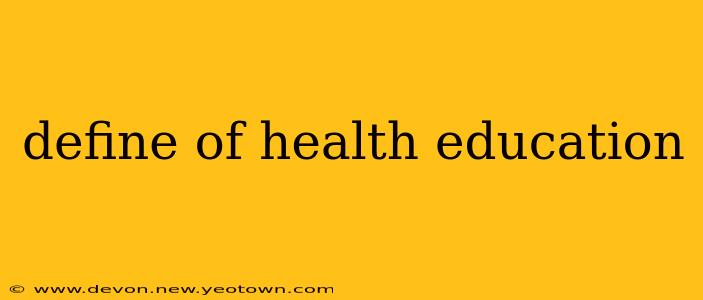Defining Health Education: Empowering Individuals for a Healthier Life
Health education isn't just about memorizing facts; it's a journey of empowerment. It's the process of providing individuals and communities with the knowledge, skills, and motivation to make informed health decisions. Think of it as equipping people with the tools they need to navigate the complex world of wellness and build a healthier future for themselves and their loved ones. It's about more than just avoiding illness; it's about thriving.
This definition encompasses a broad spectrum, extending beyond simple lectures and brochures. It involves a multifaceted approach that considers individual needs, cultural contexts, and behavioral factors. Let's delve deeper into the key aspects that define this crucial field.
What are the main goals of health education?
The primary goal of health education is to improve health outcomes by influencing individual and community behaviors. This involves fostering healthier lifestyles through various methods, ultimately leading to a reduction in preventable diseases and improved overall well-being. Specific goals often include:
- Increasing health literacy: Empowering individuals to understand health information and make informed choices.
- Promoting healthy behaviors: Encouraging behaviors like physical activity, healthy eating, and avoiding risky behaviors.
- Preventing disease: Educating individuals about risk factors and promoting preventative measures.
- Improving health outcomes: Contributing to better overall health and quality of life.
- Empowering communities: Building healthier communities through collective action and social support.
What are some examples of health education programs?
Health education programs take many forms and are tailored to specific populations and needs. Examples include:
- School-based programs: Teaching children and adolescents about healthy eating, physical activity, substance abuse prevention, and sexual health.
- Community-based programs: Offering health screenings, workshops, and support groups for specific health concerns (e.g., diabetes management, smoking cessation).
- Workplace wellness programs: Promoting employee health and well-being through initiatives like health screenings, fitness challenges, and stress management programs.
- Public health campaigns: Raising awareness about important health issues through media campaigns and public service announcements.
- Patient education in healthcare settings: Providing individuals with information about their diagnoses, treatments, and self-management strategies.
How does health education differ from health promotion?
While often used interchangeably, health education and health promotion are distinct but related concepts. Health education focuses on providing information and skills, while health promotion focuses on creating supportive environments and policies that encourage healthy choices. They work together synergistically – education provides the knowledge, while promotion provides the opportunity and support to put that knowledge into action.
What are the different methods used in health education?
Effective health education utilizes a variety of methods to reach different learning styles and preferences. These methods can include:
- Lectures and presentations: Delivering information in a structured format.
- Interactive workshops: Engaging participants in activities and discussions.
- Small group discussions: Facilitating peer-to-peer learning and support.
- Printed materials: Providing accessible information in brochures, pamphlets, and handouts.
- Digital resources: Utilizing websites, apps, and social media to disseminate information and engage audiences.
- Role-playing and simulations: Providing hands-on experience and practicing skills in a safe environment.
In conclusion, health education is a vital component of a healthy society. It's an ongoing process that empowers individuals to take control of their health and well-being, leading to healthier lives for all. By understanding its multifaceted nature and utilizing diverse methods, health educators play a crucial role in creating a healthier world.

